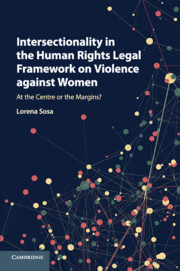 Intersectionality in the Human Rights Legal Framework on Violence against Women
Intersectionality in the Human Rights Legal Framework on Violence against Women Book contents
- Frontmatter
- Contents
- Figures
- Acknowledgements
- Acronyms
- I Introduction
- II Intersectionality in Law
- 3 The Human Rights Framework on Violence against Women
- 4 Intersectionality in the United Nations
- 5 Intersectionality in the Council of Europe and Inter-American System
- III Intersectionality in Practice
- IV Conclusion
- Bibliography
- Index
3 - The Human Rights Framework on Violence against Women
from II - Intersectionality in Law
Published online by Cambridge University Press: 25 October 2017
- Frontmatter
- Contents
- Figures
- Acknowledgements
- Acronyms
- I Introduction
- II Intersectionality in Law
- 3 The Human Rights Framework on Violence against Women
- 4 Intersectionality in the United Nations
- 5 Intersectionality in the Council of Europe and Inter-American System
- III Intersectionality in Practice
- IV Conclusion
- Bibliography
- Index
Summary
Human Rights is fundamentally a movement and its progress is maintained by the same irrepressible spirit and organized mobilizations that so recently forced recognition of private gender violence as a human rights issue and by those who continue to insist that gender violence, gender inequality and poverty are inextricable.
Copelon (1994)Introduction
The field of international human rights today shows different types of norms on Violence against Women (VAW), with different levels of binding force. They range from legally binding norms, such as conventions and treaties, to non-legally binding documents, such as declarations, programmes of action, recommendations and decisions.
Three legally binding instruments explicitly address VAW: the Inter- American Convention on the Prevention, Punishment and Eradication of Violence against Women (Belem do Para Convention); the Protocol to the African Charter on Human and Peoples’ Rights on the Rights of Women in Africa (Maputo Protocol); and the Convention on Preventing and Combating Violence Against Women and Domestic Violence (Istanbul Convention), all currently in force. These conventions, and their judicial interpretation, neatly fall under Article 38 (1) of the International Court of Justice (ICJ) Statute, and their binding nature cannot be challenged. In addition, the Convention on the Elimination of All Forms of Discrimination against Women (CEDAW) and the Optional Protocol to the CEDAW Convention (CEDAW-OP) have been widely ratified as well. With the exception of the African Protocol, these instruments form part of the normative framework on VAW examined in this book and are explored in Chapters 5 and 4.
Although there is as yet no binding international convention dealing exclusively with VAW, several non-binding documents that have been adopted at the United Nations (UN) encourage States to act in regard to the issue, creating a complex body of norms. This book looks into different types of non-legally binding norms on VAW. Numerous United Nations General Assembly (UNGA) resolutions which express concern about the situation of women, condemn VAW and call on States to take a wide variety of measures are included in the analysis.
- Type
- Chapter
- Information
- Intersectionality in the Human Rights Legal Framework on Violence against WomenAt the Centre or the Margins?, pp. 43 - 60Publisher: Cambridge University PressPrint publication year: 2017
- 1
- Cited by
